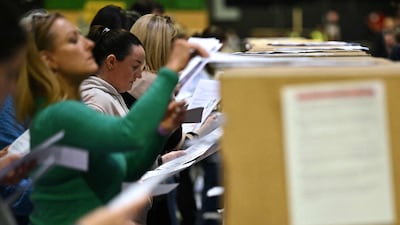Ireland's two main parties were tipped on Sunday to rotate the premier's office between them in a new government as election results suggested they would need a third or fourth coalition partner to stay in power.
Votes were being counted for a second day with all first preferences counted by Sunday afternoon, amid signs that current ruling parties Fianna Fail and Fine Gael will fall short of the 88 seats needed for a majority between them. Ireland's ranked-choice vote system can take days to produce a final result.
The two traditional rivals were narrowly ahead of left-wing nationalist party Sinn Fein in the popular vote. Unwilling to work with the party due to historical and policy differences, they are likely to need the backing of smaller parties after support collapsed for their previous Green Party allies.
Simon Coveney, a former foreign minister and deputy Fine Gael leader, said the two parties would “talk with an open mind” to Labour and the Social Democrats, who were on course to gain votes. He said a third or fourth coalition partner might be “more stable” than working with assorted independents.

All four parties in the frame take a broadly pro-Palestinian position in the Israel-Gaza war and supported Ireland's decision to recognise a state of Palestine in May. Their manifestos call for sanctions to prevent trade with Israeli-occupied territory, under legislation that was delayed by the election.
By Sunday afternoon, all first-preference votes had been counted, showing turnout at a 100-year low of 59.7 per cent. Fianna Fail was on 21.9 per cent, Fine Gael on 20.8 per cent and Sinn Fein on 19.0 per cent. Many seats were still redistributing ranked votes, with only 60 out of 174 seats allocated.
Job swap
Mr Coveney said it would be a “very difficult proposition” for Fine Gael to agree to a coalition without the role of taoiseach, or prime minister, being rotated between the two major parties. They previously carried out a job swap in 2022 when Fine Gael's Leo Varadkar took over from Fianna Fail's Micheal Martin.
Mr Martin hinted on Sunday that there would be no swift resolution, saying coalition talks “took a long time” after the last election in 2020. Asked about Mr Coveney's comments on a potential job swap, the Fianna Fail leader said: “Is Simon acting as a mediator now or what? Look, it is all for another day.”
“There’s very serious challenges facing the country and we’ve got to keep the country right and put the people before ourselves and before parties,” Mr Martin said. Asked if there was trust between Fianna Fail and Fine Gael, he said: “I think there’s capacity to get on.”

Mr Coveney predicted that Fianna Fail would win about 48 seats with Fine Gael on about 38. He said the narrower margins in the popular vote were an “important mandate that certainly Fine Gael will carry into any discussions”.
Sinn Fein leader Mary Lou McDonald said the party had “broken the political mould” but it appeared to have little prospect of forming a government after once leading polls. Current Taoiseach Simon Harris, the leader of Fine Gael, said Ireland had “not seen a Sinn Fein surge or anything like it”.
Fianna Fail and Fine Gael both have ruled out working with Sinn Fein despite Ms McDonald's efforts to modernise the party once seen as the political wing of the Irish Republican Army. They also clashed over policy during a campaign in which housing and the cost of living were prominent issues.
Fine Gael also fell back in the polls after enjoying a “Harris hop” when Mr Varadkar made way for the new taoiseach in April. Mr Harris's campaign was beset by slip-ups such as a viral video in which he snubbed a care worker who raised concerns about the government's disability policy.
The war in Gaza also played a role in the run-up to the election. Ireland's parties agree on the need for a ceasefire, but some say the government's response has fallen short, particularly after delaying the contentious bill that would effectively ban trade from Israeli-occupied settlements in the West Bank.


